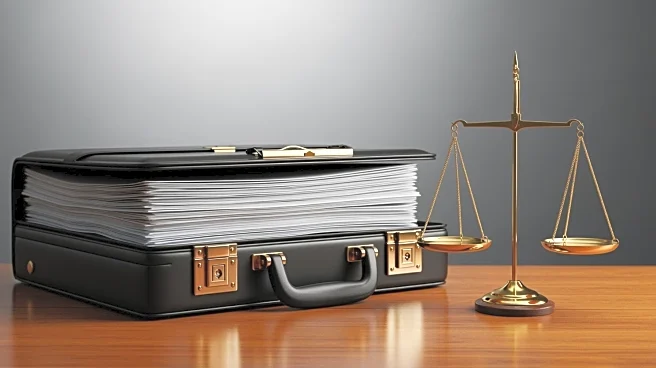What's Happening?
The ongoing flood control corruption scandal in the Philippines has led to a significant increase in demand for legal services. As construction projects stall and infrastructure spending slows, the spotlight
has turned to the legal profession. Prominent lawyers are being hired to represent individuals implicated in the scandal, including former Department of Public Works and Highways (DPWH) engineer Brice Hernandez. The scandal has seen legal counsels become highly sought after, with some of the country's top law firms declining to take on clients due to potential political repercussions. The legal fees for such cases are reportedly high, reflecting the complexity and stakes involved.
Why It's Important?
The surge in demand for legal services highlights the critical role of the legal profession in navigating complex corruption cases. This development underscores the broader implications of corruption on public infrastructure projects, affecting economic growth and public trust. The legal sector's involvement is crucial in ensuring accountability and justice, which are essential for restoring confidence in public institutions. The high legal fees associated with these cases also reflect the financial burden on those involved, potentially impacting their financial stability. This situation illustrates the intersection of law, politics, and economics, with significant consequences for governance and public policy.
What's Next?
As the scandal unfolds, further legal proceedings are expected, potentially involving more individuals and firms. The outcome of these cases could influence future public policy and anti-corruption measures. Stakeholders, including government officials and civil society groups, may push for reforms to prevent similar incidents. The legal community will continue to play a pivotal role in these developments, with potential implications for the legal profession's reputation and ethical standards. Observers will be watching closely to see how these cases are resolved and what precedents they may set for future corruption cases.
Beyond the Headlines
The ethical considerations for lawyers involved in defending clients accused of corruption are significant. The profession's duty to the court and the principle of presumed innocence are central to these cases. However, the moral dilemmas faced by lawyers in such high-profile cases can impact public perception of the legal profession. This situation also raises questions about the broader justice system's ability to handle complex corruption cases effectively. The legal community's response to these challenges could influence its role in society and its contribution to upholding justice and the rule of law.









